Biden, Jordan’s King Talk To Iraqi Premier After Saudi FM Visit
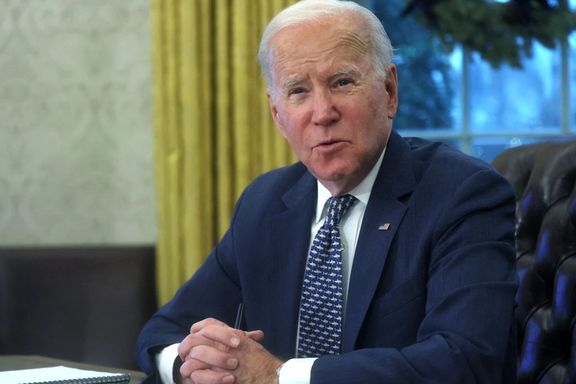
As regional and Western countries are bolstering their ties over Iraq, US President Joe Biden Thursday talked with Prime Minister Mohammed Shia’ al-Sudani.

As regional and Western countries are bolstering their ties over Iraq, US President Joe Biden Thursday talked with Prime Minister Mohammed Shia’ al-Sudani.
According to a readout of the call by the White House, Biden reaffirmed Washington’s commitment to Iraq and consulted on regional developments with the Iraqi premier.
“The President reaffirmed the US commitment to the Strategic Framework Agreement with Iraq and commended the Prime Minister’s efforts to strengthen Iraq’s sovereignty and independence,” read the statement.
They also discussed al-Sudani’s economic agenda and plans to ensure that Iraq’s economy is delivering for the Iraqi people, policies the US is prepared to fully endorse, especially to curb the influence of the Islamic Republic in the country.
Biden welcomed the upcoming visit by Iraqi Foreign Minister Fuad Hussein and an accompanying delegation next week to Washington to further discuss these programs.
The US president took the opportunity of King Abdullah of Jordan’s visit to the White House to invite him to join the call, in which King Abdullah stressed Jordan’s support for Iraq, including through joint strategic infrastructure projects.
On Thursday, Saudi Arabia’s Foreign Minister Prince Faisal bin Farhan al Saud visited Iraq, affirming that economic relations with Iraq were developing significantly. Bin Farhan made the statement during a joint press conference with Hussein.
Earlier in the week, French President Emmanuel Macron met with Iraq Prime Minister Mohammed Shia Al-Sudani, in which the two signed a set of strategic agreements meant to boost Iraq’s economic cooperation with the European country. Macron launched the Baghdad Conference for Cooperation and Partnership in 2021, which aims at strengthening regional stability by involving Iraq and enhancing its role.
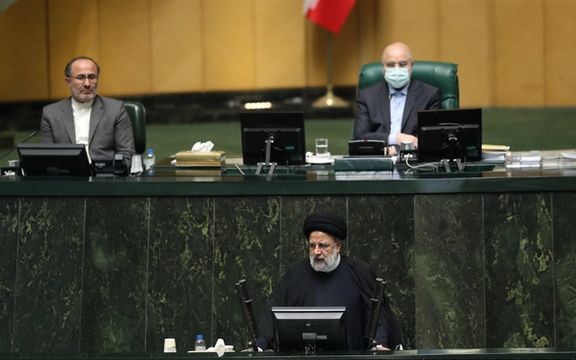
Iranian media say several lawmakers are mulling the idea of questioning President Ebrahim Raisi at the parliament amid the country’s political and economic crises.
Moderate Aftab News website reported that the lawmakers were going around in the parliament (Majles) on January 31, gathering signatures in support of the motion. However, those who support the idea do their best to conceal their identity before the motion is tabled at the Majles.
The website said that the lawmakers appear to fear reactions by Raisi and other ultraconservatives to what they are doing. Nonetheless, their names cannot be kept a secret for long. Aftab News said that they even refused to talk to reporters about the motion that signifies their dissatisfaction about Raisi's performance.
Others at the Majles, including hardliner Mohsen Pirhadi told Aftab News that questioning the president about his performance is not wrong and is part of the parliament's supervisory mandate.
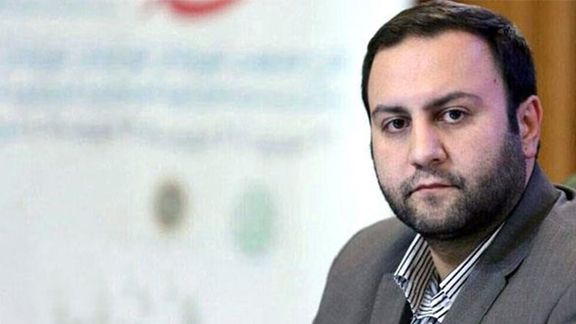
It appears that some cabinet ministers' manoeuvres to evade impeachment pushed the President into the questioning trap. After all, Raisi was the one who did his best to prevent the impeachments regardless of lawmakers' complaints about several cabinet ministers' inefficiency, wrote Aftab News.
Although lawmakers appear to be more determined this time to question Raisi, the website said that it is unlikely most deputies would vote for the motion. Meanwhile, Lawmaker Ahmad Alireza Beigi said he does not believe that Majles would take such a step. However, he said that first, cabinet ministers should be impeached and then if the plan for impeachment does not go ahead smoothly, the lawmakers can question Raisi.
Meanwhile, a Khabar Online website report on February 1 said lawmakers are planning to question Raisi on 6 grounds. According to the website, this is the second call for questioning Raisi during the past 8 months. The first time, only two lawmakers signed the motion. According to the law, at least a quarter of the 290 lawmakers at the Majles need to sign a questioning motion if it is going to go any further.
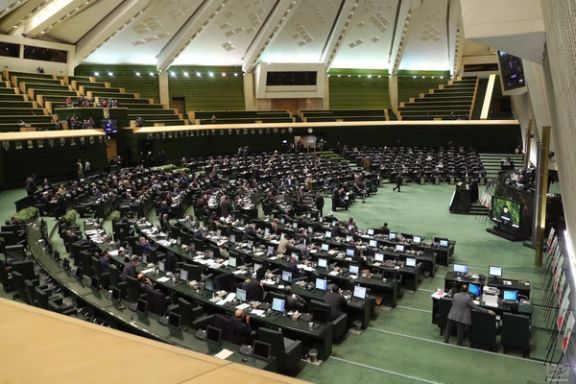
According to Khabar Online, if the motion progresses this time, the lawmakers will ask questions about "the chaotic situation of the forex market and failing to issue electronic coupons to provide essential commodities to the nation."
Khabar Online quoted one of the unnamed lawmakers who was collecting signatures in support of the motion as having said some of his peers have welcomed the idea of questioning the President, but some others are too scared to sign the request for the motion."
In April last year, Lawmaker Mostafa Hosseini Ghotbabadi had even said that lawmakers have called for designating the president as incompetent, a motion that kicked out Iran's first President Abolhassan Banisadr in June 1981.
Raisi has been most recently criticized for feeding the nation with false information and fabricated statistics about his achievements during a televised interview earlier this week. During the past months the figures he presented about inflation, employment and economic growth were seriously challenged by the media and even by hardliner newspapers published by the IRGC.
The media have been questioning Raisi's performance in the areas of housing, employment and controlling prices. The most important point made against Raisi's figures is that while the official inflation rate in January was 51 percent, He still insists that it is no higher than 40 percent.
Iran’s currency, rial has fallen to 450,000 to the US dollar speeding up inflation that is expected soon to surpass the official rate of 51 percent. All government attempts to manipulate the forex market have so far failed.
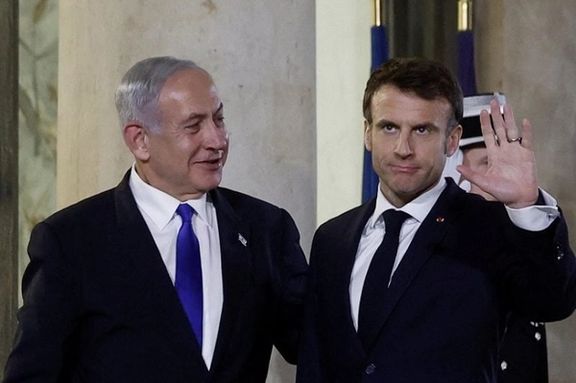
French President Emmanuel Macron has expressed concern over the progress of Iran’s nuclear program, warning of consequences for Theran if it continues its atomic project.
After a dinner meeting in the Elysee Palace with Israeli Prime Minister Benjamin Netanyahu on Thursday, Macron called for “firmness in the face of Iran’s headlong rush, which if continued would inevitably have consequences.”
The French president also noted “that Iranian support for Russian aggression in Ukraine exposes Iran to sanctions and increasing isolation,” while Netanyahu said Israel is considering sending military aid to Ukraine, which seems Israel plans to drop its more neutral stance over the conflict in the hope of securing a more anti-Iran Western position towards Tehran.
While Macron met Netanyahu in Paris, French Foreign Minister Catherine Colonna flew to Saudi Arabia and the UAE. France is a major arms supplier to both countries, with Riyadh becoming the biggest purchaser of French weapons in 2020.
Macron also mediated a regional summit in Jordan in December about the future of Iraq.
France is an important power in the eastern Mediterranean, where it maintains a significant naval and aerial presence and enjoys an historic role in Lebanon.
Before the Israeli premier took off for Paris earlier Thursday for his first meeting with Macron since he returned to power late last year, Netanyahu said the focus of his conversations with Macron would be “our joint efforts to stop Iran’s aggression and its drive toward a nuclear weapon.”
France agrees that "firmness" is needed in dealings with Iran, a diplomatic source told AFP, calling its nuclear program "dangerous" and highlighting its role in the Ukraine war.
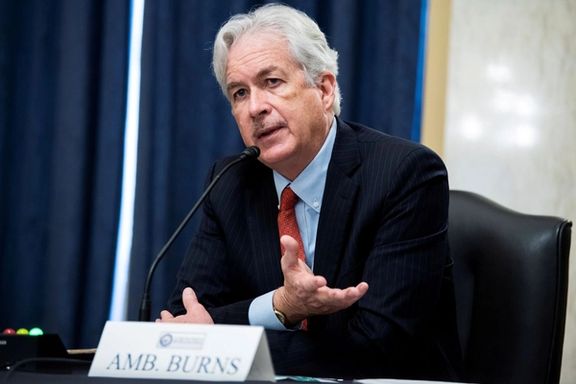
The CIA says the next six months will be "critical" for the Russian invasion of Ukraine especially as the Iranian government is busy with its domestic issues.
CIA Director William Burns said on Thursday the intelligence agency assesses that the next six months will be "critical" for Ukraine in its fight against Russia's invasion.
Speaking at a foreign policy event at Georgetown University in Washington, D.C., Burns also said Iran's government was increasingly unsettled by affairs within the country, citing the courage of what he described as "fed up" Iranian women.
Burns also said he was concerned about prospects for greater violence between Israelis and Palestinians
Tehran has supplied hundreds of drones to Russia since mid-2022 that have been used during missile attacks to inflict more damage or to swamp Ukrainian air defenses. The United States and Europe have imposed new sanctions on Tehran for its expanded military ties with Moscow and also its deadly crackdown on protests since last September.
Iran has denied supplying weapons to Russia for its war in Ukraine, but foreign minister Hossein Amir-Abdollahian after earlier denials acknowledged in early November that Tehran had supplied drones to Moscow “months before” the Ukraine war, leaving it vague if these were used in the war.
The United States and its European allies have strongly objected to Iranian drones for Russia, imposing sanctions move, and keeping nuclear talks with Tehran dormant.
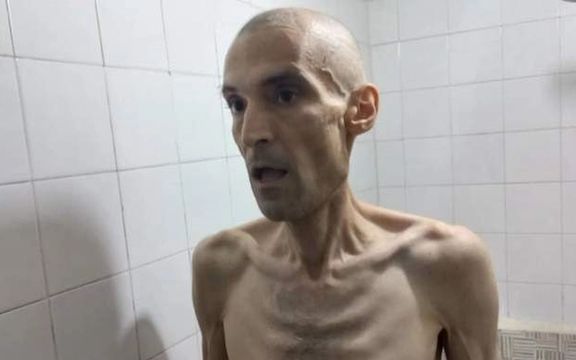
The health of long-time Iranian political prisoner, Farhad Meysami, who has lost a lot of weight due to his hunger strike, has deteriorated.
A photo of Meysami along with a letter from Rajaei-Shahr prison in Karaj were published on social media Thursday, showing him in a horrible condition after losing weight.
However, the political activist wrote in the letter to prison officials that “I will still insist on my three demands of stopping the execution of protesters, releasing six political prisoners, and stopping mandatory hijab.”
The title of political activist's letter is "For the days of suffering and suffering and suffering".
Farhad Meysami, who has been behind bars since August 2018 was arrested and sentenced to six years in jail for his activism against mandatory hijab.
Last month, in a message from Rajaei-shahr prison, he demanded the immediate release of several civil and political activists.
Meysami also went on a hunger strike in May in protest to the possible execution of Ahmadreza Jalali, a Swedish-Iranian dual national scientist taken hostage since 2016 was under the threat of execution last year.
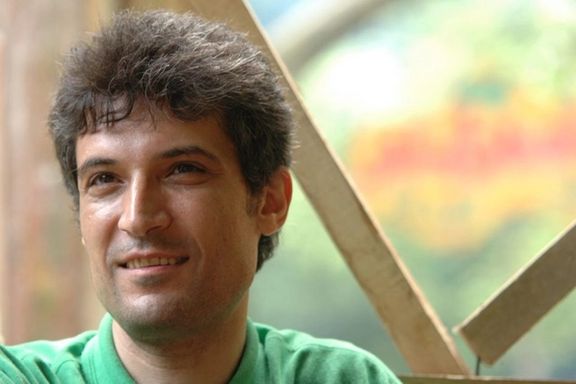
Meysami later announced that he has ended his two-week hunger strike as Ahmadreza Jalali was not executed. Before the end of that hunger strike, his physical condition was so critical that he was transferred to hospital.
Meysami, a doctor and teacher, said in a message last year that he had met Djalali at Tehran's Evin prison over three years earlier. "He had been on hunger strike in protest to repeated threats of his execution and the effects of which on his body and soul were clearly visible," he wrote.
"Imagine subjecting a human being to this repeatedly. Not once, not twice… Is there any torture worse than this?" Meysami said about repeated threats of execution made against Djalali.
"I don't want to just oppose Dr Djalali's execution, I want to draw attention to something much more important, to draw attention to the fact that they send a man to his death many times and bring him back," he wrote. "Regular and intentional torture like this is definitely crime against humanity."
Meanwhile, famous Iranian filmmaker Jafar Panahi has also gone on a hunger strike to protest his detention in Tehran while his sentence has been declared void by the country’s Supreme Court.
“I firmly declare that in protest against the illegal and inhumane behavior of the judicial and security apparatus and their hostage-taking, I have started a hunger strike since the morning of February 1… I will refuse to eat and drink any food and take medicine until the time of my release,” read a statement he sent to his wife.
Iran has been the scene of nationwide protests against the clerical regime after the death in custody of Mahsa Amini in mid-September.
Authorities have not released any information on the number of detainees, those injured and killed in the protests that began nearly three weeks ago following the death in custody of Mahsa Amini who was arrested for not wearing her hijab “properly”.
Human rights organizations says that nearly 520 protesters, including children, have been killed by security forces during the protests.
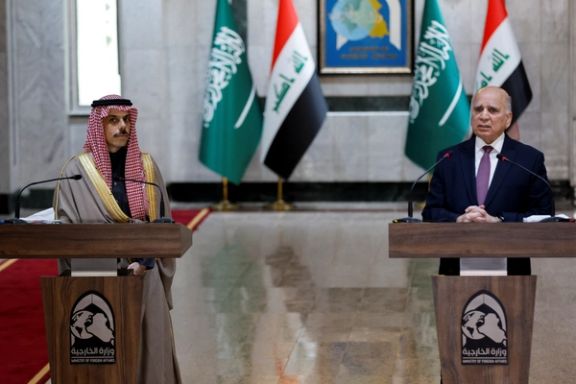
Regional and Western countries are moving to build closer cooperation with Iraq as a measure to curb the influence of the Islamic Republic in economy and politics of its neighboring country.
On Thursday, Saudi Arabia’s foreign minister, Prince Faisal bin Farhan al Saud, visited Iraq, affirming that economic relations with Iraq were developing significantly. Bin Farhan made the statement during a joint press conference held in Iraq with the country’s Foreign Minister Fuad Hussein.
Hussein said, "security cooperation continues with Saudi Arabia" and added they were “working to reduce tensions in the region,” highlighting the depth of relations with Iraq, which he stated had "witnessed great momentum recently.”
“We support the Iraqi government’s effort to enhance stability,” he said, adding that stability was crucial in order for opportunities for prosperity to rise.
Prince Faisal added that economic ties with Iraq have also “greatly improved,” noting that “The region cannot prosper without stability.”
Hussein also highlighted relations with Saudi Arabia, saying “security cooperation” is ongoing with Riyadh and added that “[We] are working on easing tensions in the region.”
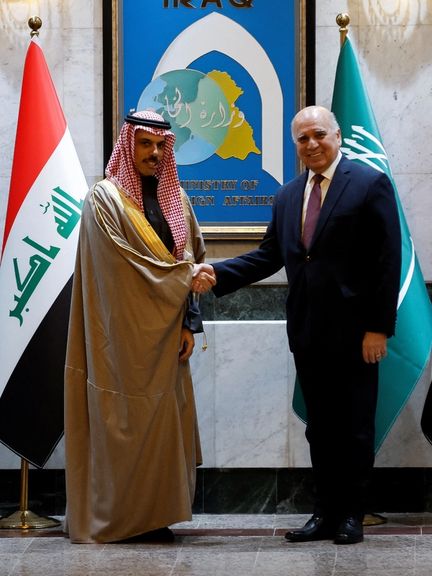
Earlier in the week, French President Emmanuel Macron met with Iraq Prime Minister Mohammed Shia Al-Sudani, in which the two signed a set of strategic agreements meant to boost Iraq’s economic cooperation with the European country. In the meeting, France and Iraq signed a treaty that seeks to strengthen bilateral relations in anti-corruption, security, renewable energy and culture, the Elysee Palace said on Friday.
Macron launched the Baghdad Conference for Cooperation and Partnership in 2021, which aims at strengthening regional stability by involving Iraq and enhancing its role.
Prince Faisal is expected to meet with President Abdul Latif Rashid, Prime Minister Mohammed Shia al-Sudani and Parliament Speaker Mohammed al-Halbous.
"This important visit comes at a time marked by great challenges, so it is essential to talk and discuss these challenges which affect the region as a whole," Hussein said, alongside Prince Faisal.
“We will not achieve these goals without a secure and stable region, and here is where Iraq plays an essential and important role in enhancing this stability. We will work together to advance the stability process in the region through dialogue, promoting common interests, and addressing any disagreements,” said the Saudi foreign minister.
Hussein hailed "total cooperation" with Saudi Arabia on oil, particularly within the OPEC cartel. Iraq's foreign minister said Riyadh was ready to back Saudi companies investing in Iraq, and welcomed it. "We hope Iraq will be supplied with electricity, either via the Saudi network or that in the Gulf," he said.
Despite being oil-rich, Iraq suffers from insufficient infrastructure and public services, after decades of conflict and endemic corruption. Baghdad is currently heavily dependent on the Islamic Republic for its electricity and gas, and has sought to diversify its energy sources. Iraq suffers from chronic electricity shortages, especially felt when summer temperatures reach scorching levels of over 50 degrees Celsius. The high temperatures subsequently push citizens to consume very high amounts of power.
Baghdad has taken a role as a mediator between the regional rivals Iran and Saudi Arabia, after diplomatic relations between Riyadh and Tehran froze in 2016. Since April 2021, Iraq has hosted a series of meetings between the two sides, but no talks have been publicly announced since April 2022.